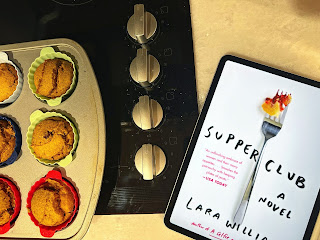Supper Club by Lara Williams: book review
Overview: The supper club is a chance to reclaim power. It's permission to take up space in every way, to be loud and obnoxious, to gorge on all of life's pleasures without guilt. It's a framework 30-year-old Roberta desperately needs to cope with her past. In a narrative that bounces between the present day and Roberta's university life, we see how deeply the people and events of her college years impact her sense of self and the ways she interfaces with the world. Overall: 4
Characters: 5 It's the characters that make this book, which makes sense considering that it is more than anything an epic character study. Roberta is unfolded in many layers from flashbacks to bad past encounters and relationships that shaped her complex feelings around love and sex to the insecurities that cling to her friendships. She's also very much framed within the contexts of different worlds. Compared to Stevie, a painter and devout artist, Roberta can appear tame, bland, and lacking in principles. But contrasted with her eventual boyfriend, Roberta is wildly feminist, idealist, and rogue. She struggles to figure out how to fit between these contexts to please everyone she loves, and in all of these different partnerships – romantic and platonic – she never manages to leave room to listen to her own voice.
The other characters that flit through this book are all complex, strange, and somewhat off-putting in their own ways. Their vibrancy makes them stick in your brain even as they, at the same time, clearly exist as a foil to Roberta. I like how this book grapples with the notion of messy people and rigid ideals.
Plot: 3 The plot is where this book struggles. We flash back and forth between Roberta in university and Roberta in the present day with no warning or changes in tense or any indication at random times throughout long chapters. The only way you notice is that the cast of characters shift or the relationships between two characters is suddenly starkly different. This time changing works; it just might have worked better if I wasn't having to work to orient myself through half a section instead of fully paying attention to what was being said.
Additionally, the book rambles a lot. There's the two big threads of Roberta mending her relationship with sex and love and the supper club's rise and fall, and within that, there's lots of little subplots. There's also long passages describing different foods (which is an interesting way to build character but also adds to the mushy feeling of a book that's already aimless on multiple fronts). The book meanders in a way that's not unpleasant but does make it hard to hold onto where it's come from or where it might be going.
Writing: 5 It's the writing and the way that Williams works with character that makes this book worth reading. The way that she wields language is just spectacular. She's always making delightfully surprising choices when it comes to the ways Roberta describes the world, and the specificity creates such a unique cadence. The odd food asides interspersed throughout were actually some of my favorite pieces of the book because it captures her amazing sentence level writing spectacularly. At the same time, her attention to voice and that micro-level writing did leave a lot of room for the actual narrative to get lost in a sea of pretty words. Luckily, I'm not too attached to the plot `if the characters and their relationships hold together (which they definitely do here), but I could've done with a bit more organization to really get these attributes to sing.
More on Reading, Writing, and Me...




Comments
Post a Comment